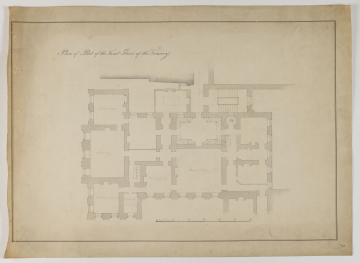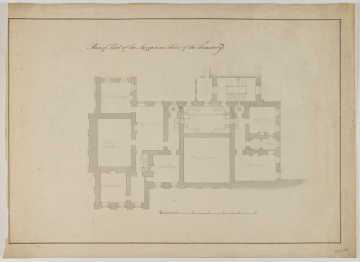Scale
bar scale of 1/12 inch to 1 foot
Inscribed
as above, labelled (pencil): Mr Arbuthnot, Mr Arbuthnots / Secretary, Mr Lushington, Board Room, Library, Mr Harrison, Long Passage
Medium and dimensions
Pen and grey wash, pricked for transfer with double ruled border on wove paper (357 x 495)
Hand
unattributed
Watermark
J Whatman 1815
Notes
The Treasury building was designed by William Kent (c.1685-1748) and built 1733-36. The north frontage which looks onto Horse Guards Parade to the left of the sheet is 88 feet wide and the building is 128 feet wide. Communication between the Treasury and Dorset House to the east on the first floor is via the 'Long Passage' that leads to and from the staircase hall. In this drawing, in rough pencil, is a design for altering the staircase with a half turn and a return eastwards. The officials named in the inscriptions are: Charles Arbuthnot (1767-1850) and Stephen Lushington (1776-1868), Joint Secretaries to the Treasury, George Harrison (1767-1841), Assistant Secretary to the Treasury, Thomas Hoblyn (1778-1860), Chief Clerk of the Treasury and William Cotton (dates unknown), Senior Clerk of the Treasury.
Level
Drawing
Digitisation of the Drawings Collection has been made possible through the generosity of the Leon Levy Foundation
Sir John Soane's collection includes some 30,000 architectural,
design and topographical drawings which is a very important resource for
scholars worldwide. His was the first architect’s collection to attempt to
preserve the best in design for the architectural profession in the future, and
it did so by assembling as exemplars surviving drawings by great Renaissance
masters and by the leading architects in Britain in the 17th and 18th centuries
and his near contemporaries such as Sir William Chambers, Robert Adam and
George Dance the Younger. These drawings sit side by side with 9,000 drawings
in Soane’s own hand or those of the pupils in his office, covering his early
work as a student, his time in Italy and the drawings produced in the course of
his architectural practice from 1780 until the 1830s.
Browse (via the vertical menu to the left) and search results for Drawings include a mixture of
Concise catalogue records – drawn from an outline list of the collection – and
fuller records where drawings have been catalogued in more detail (an ongoing
process).





